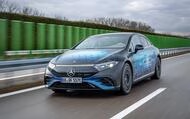Mercedes is making waves in the electric vehicle (EV) landscape, and it’s all thanks to some innovative battery technology being developed by its Mercedes AMG High Performance Powertrains (HPP) team. This initiative is not just a leap forward for Mercedes but could also redefine the future of EV batteries as we know them.
What’s the Buzz About Solid-State Batteries?
Solid-state batteries have been the talk of the town for years, and for good reason. They promise to deliver higher energy densities and longer ranges compared to traditional lithium-ion batteries. But despite the hype, we’ve been waiting for a breakthrough. Recently, Mercedes took a significant step by beginning road tests of a new battery in its EQS model, utilizing cells from Factorial Energy, a US-based company. This is noteworthy because it addresses some of the major challenges that have plagued solid-state technology.
The concept of solid-state batteries isn’t new. The earliest prototypes, developed by British chemist M. Stanley Whittingham, featured lithium-aluminum anodes. While the idea was promising, the execution was fraught with challenges, particularly regarding stability and manufacturability. Fast forward to today, and lithium metal is back in the spotlight. It boasts the highest energy capacity of any anode material, which means it could enable batteries with significantly longer ranges. However, there are two major hurdles to overcome.
What Are the Challenges with Lithium Metal Anodes?
First, lithium metal anodes tend to form dendrites—tiny, tentacle-like structures—that can grow through the liquid electrolyte in conventional lithium-ion batteries. This can lead to short circuits and, ultimately, battery failure. Solid-state batteries aim to eliminate this issue by using a solid electrolyte instead of a liquid one.
The second challenge is the physical changes that occur in lithium metal anodes during charging and discharging. As these cells expand and contract, they can cause mechanical stress in tightly packed battery configurations, leading to potential damage.
Mercedes’ HPP team has developed an ingenious solution: a hydraulically actuated ‘floating’ cell carrier. This innovative design allows the cells to swell and contract freely without sustaining damage, marking a significant milestone in the use of lithium metal anodes in production vehicles.
How Does This Impact Range and Performance?
So, what does all this mean for the EQS? The numbers are promising. With this new battery technology, the EQS is projected to achieve an impressive 620 miles on a single charge—about 25% more range than the standard EQS battery, all while maintaining the same weight and dimensions. This could be a game-changer for consumers who are concerned about range anxiety, a common issue for many EV drivers.
The cells being tested are based on Factorial’s Electrolyte System Technology (Fest), which is described as “quasi-solid electrolyte technology.” This approach combines the safety and performance benefits of solid-state electrolytes with the manufacturing ease associated with conventional lithium-ion batteries. Additionally, Factorial’s sulphide-based technology, known as Solstice, is expected to further enhance range in future trials.
What’s Next for the EV Market?
Factorial Energy isn’t just collaborating with Mercedes; they also have partnerships with major automotive players like Stellantis and Hyundai. This could pave the way for more affordable electric vehicles equipped with advanced battery technology, making the benefits of solid-state batteries accessible to a broader audience.
As the automotive industry continues to evolve, the advancements being made by Mercedes and its partners could set a new standard for electric vehicles. The potential for longer ranges, improved safety, and enhanced performance could make electric cars more appealing than ever, encouraging more drivers to make the switch from traditional combustion engines.
In a world increasingly focused on sustainability, the innovations coming out of Mercedes’ HPP team might just be the spark that ignites a new era of electric mobility. As we look ahead, it’s clear that the future of EV batteries is not just about keeping pace with current technology; it’s about rewriting the rulebook entirely.

